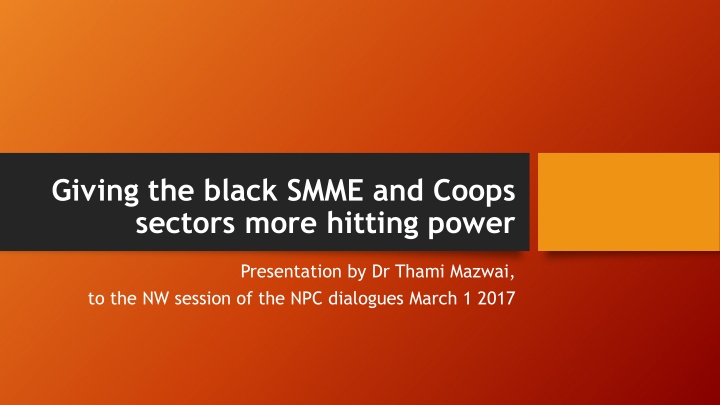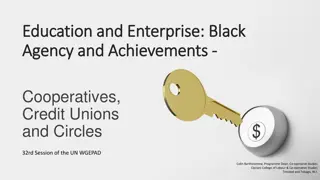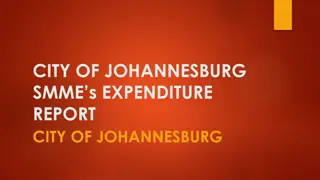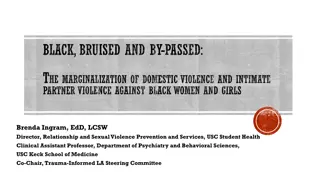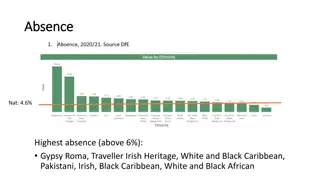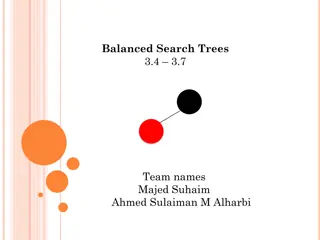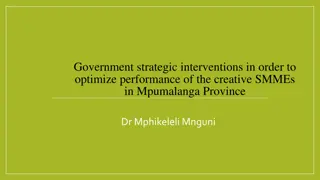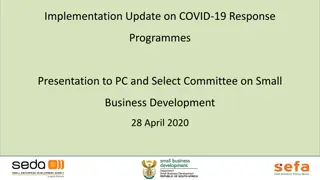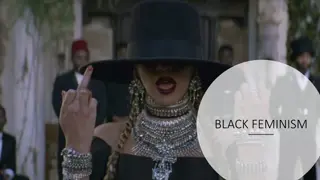Empowering Black SMMEs and Coops for Economic Growth
Dr. Thami Mazwai's presentation highlights the challenges faced by black-owned small, medium, and micro enterprises (SMMEs) and cooperatives in South Africa due to historical inequalities. The current state shows a disproportionate distribution of businesses, with a significant number operating at very low turnover levels. The need for empowering these sectors to drive economic development is evident from the disparities observed. Strategies must be devised to bridge the gap and create a more inclusive business environment.
Download Presentation

Please find below an Image/Link to download the presentation.
The content on the website is provided AS IS for your information and personal use only. It may not be sold, licensed, or shared on other websites without obtaining consent from the author.If you encounter any issues during the download, it is possible that the publisher has removed the file from their server.
You are allowed to download the files provided on this website for personal or commercial use, subject to the condition that they are used lawfully. All files are the property of their respective owners.
The content on the website is provided AS IS for your information and personal use only. It may not be sold, licensed, or shared on other websites without obtaining consent from the author.
E N D
Presentation Transcript
Giving the black SMME and Coops sectors more hitting power Presentation by Dr Thami Mazwai, to the NW session of the NPC dialogues March 1 2017
Reality of our times The majority lives in the townships and rural areas and these are the least developed areas in South Africa. They are a result of the Apartheid past which was: Horizontal discrimination in which Blacks are not allowed to be in industrial and commercial areas except as labour; and Vertical discrimination in in which blacks could not be in certain professions, trades and occupations.
New initiatives old architecture The New Order came with new initiatives but these were simply integrated into old communities. The past has perpetuated itself.
Old order perpetuated itself in democracy The race based spatial divisions continued and as markets for the already entrenched. Thabo Mbeki spoke of the two economies in one country and said the developed one must assist the underdeveloped one. But trickle down economics of neo liberalism did not work. For instance, there was no strategy on the shopping malls. Hence the missing middle. Worse still, immigrant entrepreneurs control more than 50% of trade in townships and rural areas
A comparative face of SMME sector The businesses pyramid in RSA An ideal business pyramid Big business Mid size Big business B B Medium Small, formal and informal Small and informal spread
Current state of small business Turnover level formal business Percentage in range R1 to R1 million 83% R1 million to R5 million 9.46% R5 million to R10 million 4.1% R10 million to R50 million 3.9% R50 million + 1.4%
Current state of small business About 40% of entities have turnovers, NOT PROFIT, of less than R70000 per annum, meaning less than R6000 per month About 20% have turnovers of less than R25000 per annum, meaning less than R2000 per month. The bulk of these are women
Five underlying realities in the environment Highly concentrated economy South Africa s macro culture Bureaucracy and its conception of small business Meat in the sandwich between big business and big labour Local politicians and LED or CD
The challenge The NDP exhorts 11 million jobs to have been created by 2030, and 90% from small business sector. Creating these jobs means driving self employment as you develop the small businesses or coops. It also means commodifying the ordinary lives of people so that they make a living.
The issues for discussion The main issue is: Strategies to trap and grow local spend in the localities and reduce the leakage of money to developed areas . Soweto spend in 2008 Khayelitsha spend Consumption in rural areas Hluhluwe and honey Hluhluwe and funeral undertaker
The premise of entrepreneurship The person- what he or she is doing The community and values provide opportunities and incentives Environment and macro/micro dynamics also provide incentives and challenges
Issues for discussion Strategies stimulate indigenous entrepreneurship through local spend and retaining money in local ecosystem The domination of local markets by traditional big business and immigrant entrepreneurs. How do you break this grip; The low levels of entrepreneurship activity in the Black African community
What are Governments weapons? National, provincial and municipal policies LED and IDP strategies National, provincial and municipal programmes National, provincial and municipal spend e.g. feeding schemes for schools, hospitals, correctional services and SANDF Laundry services for hospitals, correctional services and army Infrastructure projects remove focus from big suppliers and concentrate on township and rural entities as suppliers with ESD linked to it. They also did it
The realities must determine the strategy The identification of production units, assessing their potential and relating them to spending by the Government India and bakeries; The creation of value chains within communities fuelled by the identification of these production units; Strategies to graduate informal and micro enterprises into the mainstream e.g. Jozi at work; The cultivation of linkages between SMMEs, infrastructure rollout and industry; and ED programmes for these entities to deal with their self esteem ( The above is not exhaustive but address the immediate )
Discussing township and rural economies Issues for discussion continued: Mutually beneficial relations between local and big business; The effectiveness of IDPs and other government initiatives, including officials and town council members; The effectiveness of local chambers of commerce and/or associations; and Strategies to measure successful entrepreneurship and relations
The main issue for discussion The main issue for discussion is the recall of Steve Bantu Biko How do we change the black mind White business is thriving in the townships because the black person does not believe himself to be capable of creating business empires. He does not believe that blacks can create quality How do we change this? This is the basis of the summit
End of presentation Discussion, discussion and discussion Dates and venues for the dialogues
